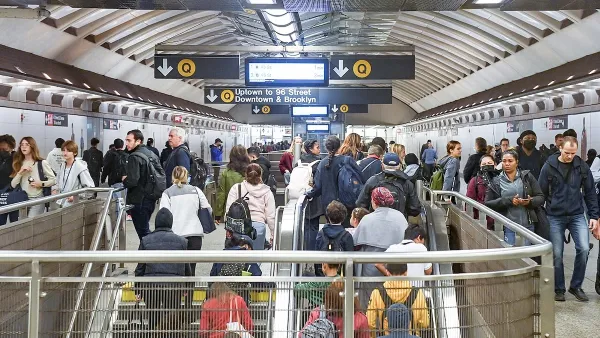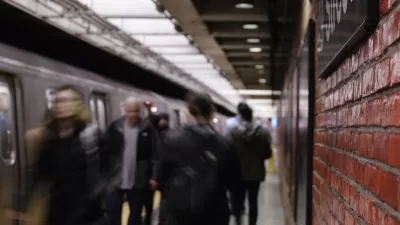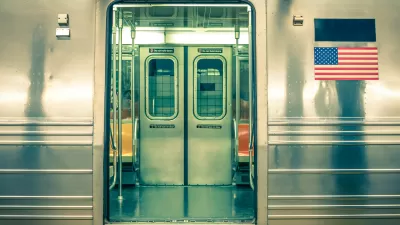After a shocking death and an overall rise in violent crime at its stations, New York City's transit authority will install platform barriers to prevent intentional or accidental falls onto tracks.

The New York MTA will test platform barriers at three of its stations. As Michael Gold and Ana Ley report, the move comes after one woman was pushed in front of a train at the Times Square station, which safety advocates argue could be avoided by installing the glass doors present in many other subway systems around the world. "The announcement comes as many New Yorkers have become anxious about safety on the subway, where the rates of violent crime per million weekday passengers have risen during the pandemic even as ridership has plunged, and where the number of people who end up on the tracks, most of them intentionally, is rising."
The barriers, also called platform edge doors or platform screen doors, block riders from accessing the tracks until a train has arrived. While the MTA has insisted that installing them in all of New York's subway stations isn't feasible due to "special complexities" and cost, the recent death of Michelle Alyssa Go, the woman who was pushed off a platform, prompted the agency to take up the issue once more. "Still, expanding the pilot would present significant financial and logistical challenges. The price tag for installing barriers at the 128 stations would be about $7 billion, according to the 2019 report [released by the MTA]."
In addition to the doors, the agency says it is exploring additional options for safety improvements that include cameras at the front of trains, increased police presence on platforms, thermal detection systems, and public service announcements that address mental health and warn riders away from the tracks.
FULL STORY: Subway Platform Barriers Will Be Tested at 3 N.Y.C. Stations

Maui's Vacation Rental Debate Turns Ugly
Verbal attacks, misinformation campaigns and fistfights plague a high-stakes debate to convert thousands of vacation rentals into long-term housing.

Planetizen Federal Action Tracker
A weekly monitor of how Trump’s orders and actions are impacting planners and planning in America.

In Urban Planning, AI Prompting Could be the New Design Thinking
Creativity has long been key to great urban design. What if we see AI as our new creative partner?

Pedestrian Deaths Drop, Remain Twice as High as in 2009
Fatalities declined by 4 percent in 2024, but the U.S. is still nowhere close to ‘Vision Zero.’

King County Supportive Housing Program Offers Hope for Unhoused Residents
The county is taking a ‘Housing First’ approach that prioritizes getting people into housing, then offering wraparound supportive services.

Researchers Use AI to Get Clearer Picture of US Housing
Analysts are using artificial intelligence to supercharge their research by allowing them to comb through data faster. Though these AI tools can be error prone, they save time and housing researchers are optimistic about the future.
Urban Design for Planners 1: Software Tools
This six-course series explores essential urban design concepts using open source software and equips planners with the tools they need to participate fully in the urban design process.
Planning for Universal Design
Learn the tools for implementing Universal Design in planning regulations.
planning NEXT
Appalachian Highlands Housing Partners
Mpact (founded as Rail~Volution)
City of Camden Redevelopment Agency
City of Astoria
City of Portland
City of Laramie





























